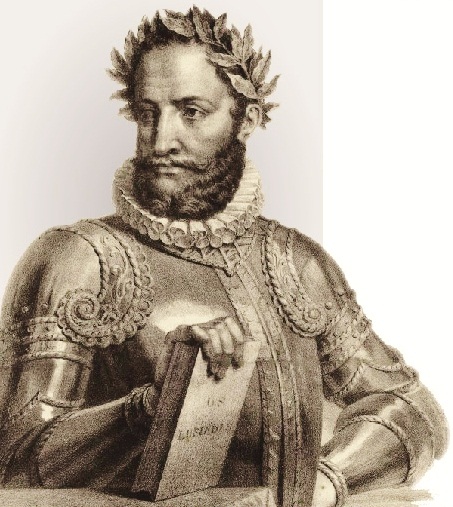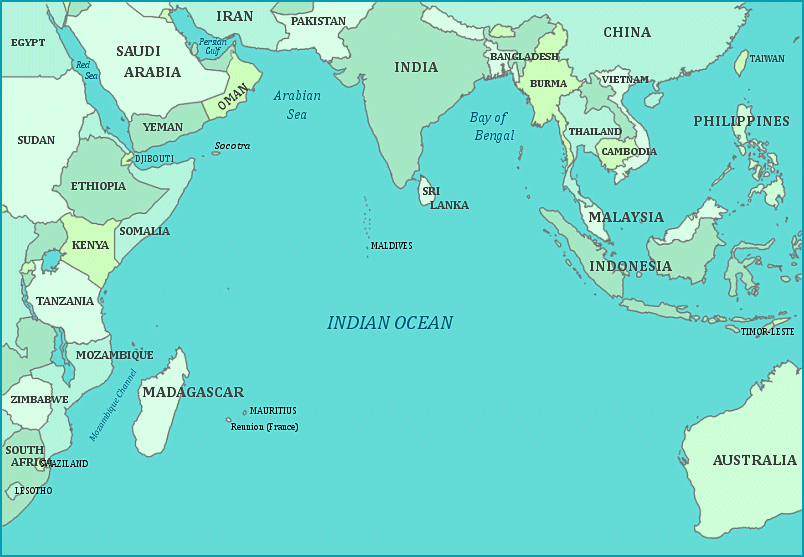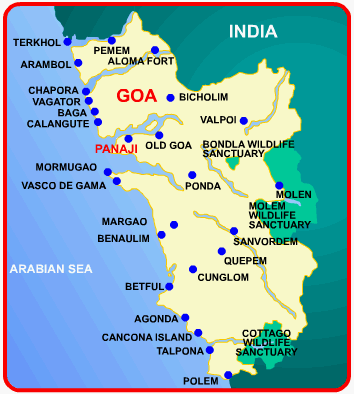Towards the end of the sixteenth century, Portugal’s mercantile empire began to cede its primacy in world affairs to the Spanish and Dutch; and like Spain after her, she was unable to convert the rapidity of her material gains to sustained economic influence. Lisbon was choked with corrupt officials, living off royal patronage, while avaricious merchants stacked their reis against a backdrop of inequality and exploitation. Yet Portugal shared with Spain a passion of blood and creed, and her empire still commanded respect for its cartographic extent and majesty of conception. It was an age of overseas conquest, lusty adventures, and lives of intense florescence but short duration.
It was against this tapestry that Portugal’s greatest poet appeared. Luiz Vaz de Camões, much like Spain’s Miguel de Cervantes, illustrates the truth of the maxim that one cannot write unless one has first lived. And live he did. He was born in 1524 at either Lisbon or Coimbra (we are not certain) from a father who derived an uncertain income from seafaring. He died in a shipwreck off Goa, in India, soon after his son Luiz was born, leaving his progeny with little more than hope and ambition.
We do not know the scope of his education, but it must have been one rich in religion and the classical authors, for his great poem, Os Lusiadas (The Lusiads), rings with both Catholic solemnity and Virgilian grandeur. As so often happened to young men of that era who were rich in eloquence but poor in family connections and influence, he offended some petty official and was sent into exile, first in Tagus and then in Ceuta.
He seems to have joined, or to have been made to join, the army at this point; at Ceuta he lost one of his eyes in either a military engagement or a duel. He then appears back in Lisbon, where he was jailed for eight months for his participation in a brawl while protecting some friends. Like Cervantes, he must have been relieved finally to take to the open ocean and find an outlet for his ambition; at age twenty-nine (1553) he shipped as a soldier aboard a vessel bound for India. Resentful of his sufferings in his native land, he is reported to have quoted Scipio Africanus as he departed by saying, “Ingrata patria, non possidebis ossa mea!” (Ungrateful country, you will not have my bones). It was on this six month voyage, in his free moments, that he began the composition of one of the world’s greatest works of epic poetry.
Camões was a soldier was well as a poet; and in India, the East Indies, Macao, and off the African and South Arabian coasts, he took part in numerous pitched battles as a member of the flagship of Fernão Alvares Cabral. He was known by the sobriquet of “Trincafortes” (Swashbuckler), and one suspects that the epithet was well-deserved. Through all of the privation, adventure, combat, and suffering, he kept working steadily on his poem, a work that he hoped would “increase the glory of Portugal and make Smyrna envious despite her being the birthplace of Homer.” One sonnet written in Africa boasted that he wielded a pen in one hand and a sword in the other (“One hand the pen, and the other the sword employed”).
Many stories are told of his adventures in the eastern seas: one tradition has him swimming ashore after a shipwreck near Cambodia with his manuscript in his mouth, preferring to rescue it in preference to his Chinese mistress Dinamene. He was apparently imprisoned many times for debt and general misbehavior, freed every time by sympathetic friends or superiors; we even find him marooned in Mozambique for nearly two years, his pecuniary miseries forestalling any return to Europe.
His poem finally found print in 1572, and King Sebastian found fit to provide him a modest pension, probably more for his services in the Far East than for his literary efforts. He died in 1580 at the age of fifty six (some sources given conflicting dates), heartbroken at the 1578 defeat of the Portuguese in the Battle of Alcácer Quibir.
His poem shaped the language of his country as much as Dante did Italian or Shakespeare did English. Its general theme is the epic voyage of Vasco da Gama to India; but into this historical narrative, Camões grafts gods, auguries, portents, storms, and similar Homeric flourishes to produce something strangely original. Those of us familiar with the modern rhythms of Brazilian Portuguese will find the antiquated language nearly inaccessible without the help of a decent translation. But even through the medium of translation, the grandeur and passionate resonance is irrepressible. The opening of the first canto has echoes of Virgil:
ARMS and the Heroes, who from Lisbon’s shore,
Through seas where sail was never spread before,
Beyond where Ceylon lifts her spicy breast,
And waves her woods above the watery waste,
With prowess more than human forced their way
To the fair kingdoms of the rising day:
What wars they waged, what seas, what dangers passed,
What glorious empire crowned their toils at last,
Ventrous I sing, on soaring pinions borne,
And all my country’s wars the song adorn;
What kings, what heroes of my native land
Thundered on Asia’s and on Africa’s strand:
Illustrious shades, who levelled in the dust
The idol-temples and the shrines of lust.[1]
The Lusiads, said Voltaire, has “a sort of epic poetry never heard before. No heroes are wounded in a thousand different ways, no woman enticed away, and the world overturned for her cause.” It is a poem unabashedly singing the glories of travel and adventure, of lands, nymphs, and maidens conquered; its pages are not darkened by tiresome theologies or rhetorical rants, by geographical digressions or lists of names and families. Camões, like Joseph Conrad three hundred years later, had lived these oriental adventures, and when he sang of them, he sang of himself. It is the most triumphant poem ever written.
As we recite his lines to ourselves, we are conscious of a mystic connection, reaching through the ages, which all great travelers somehow share. In the halls of this pantheon we will find Columbus, Ibn Battuta, Hanno the Carthaginian, Magellan, Vasco da Gama, and a hundred others. Their deeds made them great, and their writings conferred on them immortality.
He was granted a modest pension in his final years, content to settle down, after having lived enough for ten lives. His fame grew steadily, a reward after a lifetime of struggle. One of his last letters contained this line: Em fim accaberey à vida, e verràm todos que fuy afeiçoada a minho patria. (“I am ending the course of my life, and the world will see how I loved my country”). Another reported statement by him, just before his death, struck a philosophic tone: “Who has seen on so small a theatre as my poor bed, such a representation of the disappointments of Fortune! And I, as if she could not herself subdue me, I have yielded and become of her party; for it were wild audacity to hope to surmount such accumulated evils.”
The end came quietly. To Camões, Fortune had both granted and taken away. But in the balance, he had managed to tip the scales in his favor. For as long as the Portuguese language is spoken, and as long as there is a Portugal, Camões and his poem will endure forever.
Read More: How To Build A Dynasty



Such a shame that we are not taught these things in school. Again, this is something I’d never heard of.
Thanks for bringing it to the attention of everyone.
They don’t want us to know about the glories of the past. Too much familiarity with our ancestors would bring to our attention just how far we have fallen. These people are evil. They want to destroy the cultural heritage of Western civilization, so we can be easy prey to degenerate ideologies and debased conceptions of humanity. This is their goal, whether stated or not. We are engaged not only in a battle for masculinity, but a battle to preserve culture. Anyone who thinks differently is deluding himself.
If we can promote a renaissance of the forgotten ethics, languages, literatures, leadership, and masculine virtue of the past, then we will arm ourselves against the predations of the Marxist-feminist wolves.
Took the words right out of my mouth man. To that end I’ve sent you a PM on the forum about something I’ve got going in the works in regards to that third paragraph.
Took the words right out of my mouth man. To that end I’ve sent you a PM on the forum about something I’ve got going in the works in regards to that third paragraph.
The only thing they would teach about the Portuguese is their role as oppressors. This is what academia finds valuable these days – victimhood.
You’re not alone in that sentiment about people not wanting us to know about the glories of the past, QC.
An ignorant populace is easily manipulated into doing whatever their government wants them to do.
“They don’t want us to know about the glories of the past. Too much familiarity with our ancestors would bring to our attention just how far we have fallen”
That’s an excellent insight. It’s bad enough that the contemporary is crapping out, but when they discourage the learning of history it’s pretty sad.
Of course this means the powers that be have to fill in the classroom session gaps. Didn’t California pass a law now requiring state school to teach gay history or some shit similar? Or was it the Anthropological Origins Of Transgender Vomit Sex? Whatever the case, schools in Femerica are going downhill fast.
Good stuff man! Last year I read William Manchester’s excellent book “A world lit only by fire” about the Medieval age, and encountered for the first time the story of Ferdinand Magellan. He was also a man of true grit, although was overcome by religious madness that led to his death. Manchester argues convincingly that although Portugal largely disowned him, his actions led to the Philippines remaining one of the most devoutly Catholic countries in the world. I recommend this book as a great insight into the continual awakening of the human mind, although we are prone to become snared in cul-de-sacs such as the one you mention above.
I’ve read that one too, a long time ago. Manchester has some good titles.
On a related note, I recently camped near an abandoned town in the mountains of North Carolina which had a cemetery from the 1800s. While there was evidence of stillbirths and several graves of children, the adults regularly lived into their 70s. I always operated under the impression that we are far better off today with modern medicine. The truth is, if one could survive pregnancy and childhood, the typical person could live just as long 200 years ago as today.
I recently heard a talk by my local health department chief, and he stated that 90% of the gains in life expectancy and public health over the past century had nothing to do with hospitals, doctors, drugs, etc. but were simply public health policy–sanitation of drinking water, underground sewer systems that kept shit away from you, restaurant inspections that provide some level of sanity in the kitchen, etc. The medical industry as a whole has minimal effect on health or life expectancy. The analogy is like an iceberg.. everyone sees the 10% tip above the water which is the “health care industry” but no one notices the 90% below, which is public health.
But of course they don’t want you to know that either, and want you to pay thousands of dollars a year to the medical industry via forced insurance.
what school teaches you about history can be summed up as follows, during the Vietnam War period you’re taught more about the protests.
“It is a poem unabashedly singing the glories of travel and adventure, of lands, nymphs, and maidens conquered; its pages are not darkened by tiresome theologies or rhetorical rants…”
This. Imagine to get to enjoy the world and the adventure of being alive without SJWs dictating your experiences to have them fit their narrative.
SJWs need to learn the value of disagreeing without labelling all their opponents as misogynists, rapists… Yeah, you’ve heard all the shaming before.
This goes right at the heart of gamergate.
“SJWs need to learn the value of disagreeing without labelling all their
opponents as misogynists, rapists… Yeah, you’ve heard all the shaming
before.”
That won’t happen because labeling their opponents like that gives SJWs their power.
“By controlling the language, you control the people.” – George Orwell
Even in english it brings tears to my eyes! Time when men were men, and they waited in line to go into the unknown, with only sword in hand and vague promises of return. They did not wait for the new iPhone, neither would they never!
Thanks for cracking an egg of knowledge on my dome.
Awesome as usual Quintius! I love how you perfectly blend history, drama and adventure to make us reflect on masculinity. Keep up the good work!
Quintus, you speak to a brand of masculinity that is entirely ignored in the mainstream. A type of masculinity that isn’t defined by women, for women. After I read this I went back and looked at all your other posts and I must say that you are very inspiring. They should make young boys in elementary and middle school come to this site and read your stuff. It would do them a world of good to hear about such manly virtue. I know I would have greatly benefited from stories like the ones you tell.
Thanks, Rolo. I appreciate that. The response to the Kindle version of my “Thirty Seven” has been extremely positive, exceeding all expectations. (I am preparing a print version of the book now, which should be ready soon).
Great news about the print version.
I can’t believe I’m reading this on here! I must’ve come across that poem when I was twelve or so, and haven’t seen it anywhere since! Thank you so much for this. Not only do I now have the poem and author, but a backstory as well! Gratitude. 🙂
Go back and read Quintus Curtius’s other articles, they are the best ones here.
Here Here!!!
I don’t think you should respond to women. We don’t want to encourage more women to come here and screw up the discourse.
And don’t like their comments either.
Nice article! Just compared the English and the Portuguese one. Translating this was
not easy. It sounds much harder to understand in English.
In the original every verse has 10 syllables and every stanza has 8 verses.
The poetry has 1102 stanzas, and in all the 8816 verses the rhymes go as follows:
The 1st verse rhymes with the 3rd and 5th.
The 2nd verse rhymes with 4th and 6th.
The 7th and the 8th verse rhyme.
There are many internal rhymes (rhymes in each verse) that give it a singing sound through the poetry.
Yes, it’s not easy, but can be tackled in small parts.
Awesome as always. I’d heard about this epic poem before but wasn’t interested. Now I’ll definitely read the whole thing after that back story.
Arma virumque cano with a Portuguese flavor indeed.
Quintus, you’ve just inspired me to write an article. This Luis Vaz de Camoes reminds of someone who too shared the love for his country but unfortunately had to sacrifice dearly for it.
OT: Obama sexual assault under ‘yes means yes’: Under California’s recently passed ‘yes means yes’ law, Obama sexually assaulted that female voter this morning by kissing her prior to getting her affirmative consent prior to kissing (sexually assaulting) her. Given that the Obama administration is driving this yes means yes thing, I cannot believe no one else has called him out on it.
Could you tell what sources you used for the opening paragraph? I’m interested in the failings of the Portuguese Empire.
|♡|
So is Marxism the same thing as Socialism? Or is it just a short step lower from Socialism? Someone elaborate for me.
Quintus I wanted to briefly comment and say thank you for your posts. I love history and find myself looking forward to your articles about little known great and interesting men. (I’m actually an Ancient Roman history buff myself).
While I don’t necessarily mind the posts about deficiencies in the female psyche or what have you, it seems akin to beating a dead horse. Anyone with a smidgen of logic can see those deficiencies. What I find lacking are posts that concentrate on self improvement and direct men towards historical role models. In short I appreciate you and the authors that focus on what men CAN do and CAN aspire to emulate, as opposed to what men have no real control over, namely society’s deterioration.
Beautiful. Hope to read this and others in 37+
Woop! Some is wrong on the internet! Scipio’s tomb allegedly read: “Ingrata patria, ne ossa quidem habebis” = Ungrateful fatherland, you shall not even have my bones.
I am now validated for the week.